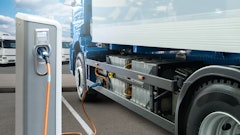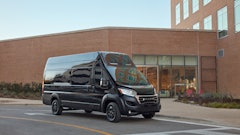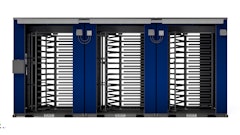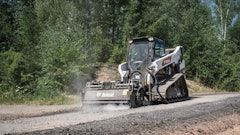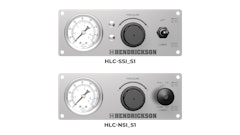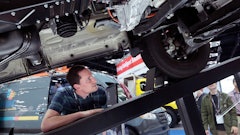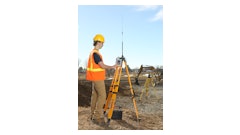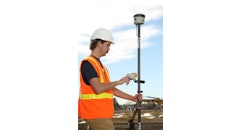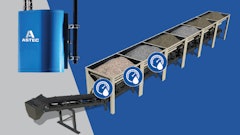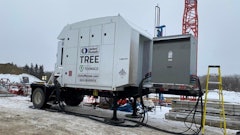For a lot of construction equipment OEMs, the topic of electrified machines is still somewhat of a discussion of the future.
Now, it’s true that hybrid and electric drive machines from companies like Komatsu, Deere and Cat have become commonplace, though not exactly common on jobsites. But when it comes to battery-powered machines, the only announcements from the majority of OEMs have been concepts like Deere’s 310 X-Tier backhoe or made-to-order machines like Case’s 580 EV.
But for Volvo Construction Equipment, battery-powered machines aren’t something off on the horizon of the near future. They’re here today—in the present.
Volvo Stops Development of Diesel Compact Machines
In fact, Volvo first unveiled its first production battery electric machines in 2019, the L25 compact wheel loader and the ECR25 compact excavator.
Along with that, the company stated its intent to replace all of its diesel-powered compact construction equipment with battery-powered models that match or exceed the power, production and capability of the diesel machines they will replace.
Toward that goal, the company has ceased diesel development entirely on its compact equipment. It’s unclear how much longer Volvo will continue producing diesel-powered compact machines, but moving forward, all new machines and new development will be on battery-powered machines.
In Europe, Volvo has already started delivering its electric loader and excavator and there are about 200 machines in the field. Here in North America, those machines are available for pre-order, but deliveries haven’t yet started. But this limited availability hasn’t slowed the rollout of the overall electric lineup. In fact, just in the last week Volvo announced three more machines that are coming down the pike: the L20 loader, and the EC18 and ECR18 excavators.
The Platform
We’re going to get into the development and field testing for these machines along with each of their individual details, but before we do that, let’s talk a little bit about the overall details behind Volvo’s electric powertrain.
In terms of the batteries themselves at the heart of these five machines, Volvo has implemented a range of capacities spanning from 16 kWh up to 40 kWh.
I mentioned before that Volvo is developing these machines to provide identical performance to their diesel-powered counterparts. As attested to by the customers and operators that have been testing and working these machines in the field since 2019, these machines deliver on that promise, but they do so with almost no noise, a lot less vibration and zero emissions.
Runtimes and Charging
But the big question with battery-powered machines is runtime and how that stacks up to charge time. The good news is that Volvo says all of these machines can charge from 0 to 100% in under six hours.
The less-good news pertains to the runtimes which currently range anywhere from 2.5 to 12 hours, depending on the machine and how hard you’re pushing it.
But, let’s say you know you’re going to be pushing the machine hard and you’ll want to be able to charge during the day either over a break or during lunch. For these use cases, Volvo has also developed an optional off-board fast charger that will charge the larger batteries found in the L20 and L25 loaders in under two hours. That means, during lunch you’d be able to get about 50% charge back.
Meanwhile, the smaller batteries found in the excavators can achieve 80% charge in just an hour and 15 minutes with this fast charger.
The main caveat to the fast charger is you have to have the nearby electrical infrastructure to support it. Now, these are compact machines so, the amount of them that will be in use on remote jobsites is probably pretty low. But for argument's sake, let’s say you are using them on a remote jobsite that can’t support a dedicated fast charger.
For this situation, Volvo is also developing mobile battery packs that can be transported to a jobsite and used to charge the machines—kind of like the small battery packs we use to top up our phones.
But these battery packs will be huge 600-volt arrays scaled down with an inverter to be a 48V direct charge for the machines. It’s important to note that these mobile battery packs are not yet slated for production as they’re still in a prototype stage, but it’s interesting that Volvo sees and appreciates the need for such a solution.
Plus the other interesting aspect of these mobile battery packs is that Volvo says the batteries the company would use on these mobile packs are the same battery arrays that they plan on putting in their larger equipment down the line.
All Five Models
But let’s dig into the individual machines themselves with a few details on each.
First up is the L20 compact wheel loader, a 4.5-ton loader that offers 1.8 tons of payload. The cool thing about this machine is that it also packs a parallel linkage giving you 100% parallel movements, making it perfect for fork applications. On this machine, you have a choice between 33 kWh of battery capacity or 40 kWh of capacity and Volvo expects it will achieve 6 hours of working time on average.
Next is the L25. This is the L20’s big brother, a 5.5-ton loader with a Z-bar linkage and a 40 kWh battery providing an average of 8 hours of runtime.
The EC18 is a 1.8-ton conventional tail swing excavator with an undercarriage that retracts to less than 3.3 feet and expands up to 4.4 feet for squeezing into tight spaces. The design of the EC18 keeps the right frame corner, swing post and cylinder all within the tracks’ width while you rotate the machine. The EC18 packs a 20 kWh battery and has a runtime of 3-5 hours, depending on how hard you push the machine.
Volvo has also announced a short radius version of the EC18 called the ECR18. It’s also a 1.8-ton machine but with only 12mm of overhang in the back. Like the EC18 the right frame corner stays within the frame of the machine when rotating. This machine is available only with a canopy and it’s 16 kWh battery gives it a runtime between 2.5 and 4 hours.
Rounding out this initial Volvo electric fleet is the ECR25. This is a 2.7-ton zero tail swing radius machine with a 20 kWh battery providing up to 4 hours of runtime and a very quiet, very comfortable sealed cab.
North American Testing and a Call For Zero Emission Machines
The L25 wheel loader and the ECR25 are the two machines that Volvo first introduced back in 2019. As such, they’re the machines Volvo has already delivered in Europe. Though they haven’t started shipping in North America just yet, Volvo recently completed a major customer testing program with these machines made possible by a $2.1 million grant from the EPA.
The L25 and ECR25 went out to a number of different customers in the last year, tackling a variety of different applications for a total of 400 jobsite hours. Volvo says that customers were excited to try the machines out and operators were really happy with their performance and maybe even more so how the battery-powered powertrain cut down on noise.
Volvo says the machines produce 90% less ambient noise than their diesel counterparts. More importantly, in those 400 hours of jobsite time, Volvo estimates that the L25 and ECR25’s zero emissions eliminated 6 tons of CO2 that would have been released from their diesel counterparts.
And that’s an important point to make because Volvo says that its customers—both globally and here in North America—are starting to clamor for machines that pollute less.
Just as the accuracy and productivity delivered by technologies like machine control have helped many contractors in the bidding process—especially with state DOTs—having zero emissions equipment in your fleet is likely going to be a competitive edge for contractors in the future as well.
Volvo cites 50% of states in the U.S. having set goals to reduce greenhouse gas emission targets moving forward. Plus, the Biden administration has set a goal to reduce greenhouse gas emissions by 50% by 2030.
And while cars and trucks contribute to the vast majority of greenhouse gas pollution, contractors and the states and clients that employ them have a identified off-highway equipment and trucks as major culprits as well.
But when will customers here in North America be able to get their hands on these Volvo battery-powered machines? Well the ECR25 has been available for pre-order for a while now and Volvo plans to make the first deliveries of those excavators in January.
Meanwhile, the L25 loader is slated for “early 2022” deliveries. As for the EC18, ECR18 and L20? Those first deliveries are planned for the second half of 2022.











